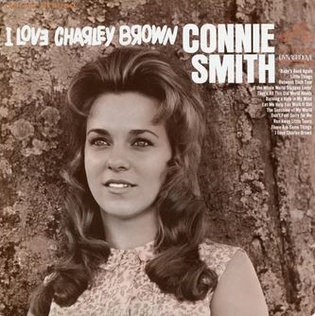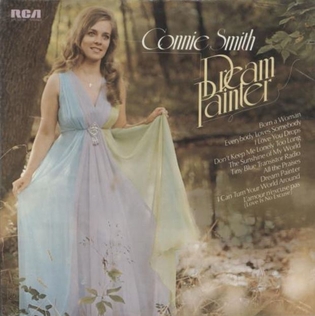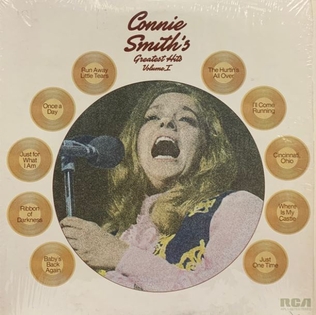Related Research Articles

Connie Smith is an American country music singer and songwriter. Her contralto vocals have been described by music writers as significant and influential to the women of country music. A similarity has been noted between her vocal style and the stylings of country vocalist Patsy Cline. Other performers have cited Smith as influence on their own singing styles, which has been reflected in quotes and interviews over the years.
"Why Don't You Love Me" is a song by American singer and guitarist Hank Williams. The song reached number one on the U.S. Country & Western chart. It was released as a single in 1950 with the B-side, "A House Without Love".

Downtown Country is the sixth studio album by American country singer Connie Smith. It was released in January 1967 by RCA Victor. Downtown Country was the second of Smith's albums to include string instrumentation to help create a pop-influenced sound. The album also featured the single "The Hurtin's All Over", which reached the top five of the Billboard country chart. The album itself reached the top five of Country LP's chart following its initial release.

I Love Charley Brown is the tenth studio album by American country singer Connie Smith, released in April 1968 by RCA Victor. The album reached the top 20 of the American country albums chart. It was described as a collection of pop-inspired country songs. Included were four cuts written by Smith's longtime songwriting collaborator, Dallas Frazier. Among his cuts was one of the album's three singles, "Run Away Little Tears". Along with Frazier's cut, the two additional singles included reached the top ten of the American country songs chart. The album was met with favorable reviews from critics.

Just One Time is the sixteenth solo studio album by American country singer Connie Smith, released in June 1971 by RCA Victor. The album was named for the lead single of the same name, which reached the top five of the North American country charts in 1971. The album itself would chart in the top 20 of the American country LP's chart following its release. Additionally, Billboard magazine gave the project a positive reception when reviewing it in 1971.

Ain't We Havin' Us a Good Time is the eighteenth solo studio album by American country singer Connie Smith, released in April 1972 by RCA Victor. The album contained ten tracks which were considered to have a "thicker seventies" sound, according to one biographer. Included on the album was Smith's single, "Just for What I Am". It became a top five single on the North American country songs chart while the album itself reached the American country LP's top 25. Ain't We Havin' Us a Good Time received a favorable review from Billboard magazine following its release.

Dream Painter is a compilation album by American country singer Connie Smith, issued in July 1973 by RCA Victor. The album was released following Smith's departure from RCA Victor and contained previously-released material. Two new recordings were also featured, including the title track. Released as a single, the title track would reach the top 30 of American country songs chart. The album itself would chart the American country LP's chart in 1973.

Connie Smith's Greatest Hits, Vol. I is a compilation album by American country singer Connie Smith, released in October 1973 by RCA Victor. The album was one of several compilations released following Smith's departure from RCA Victor. It included ten of Smith's most popular singles from her career, such as the number one single, "Once a Day", and top ten single, "The Hurtin's All Over". The album charted on the American country LP's chart in 1973 and received a positive review from Billboard magazine.

A Lady Named Smith is the twentieth solo studio album by American country singer Connie Smith. It was released in May 1973 by Columbia Records, her first album for the label. The production and style featured a string instrumentation to help market Smith in the pop field. Included were a mix of new material and covers of previously-recorded songs by other artists. The album's only single was the original tune, "You've Got Me ", which reached the American country songs chart in 1973. A Lady Named Smith would also chart on the American country albums chart in 1973.

That's the Way Love Goes is the twenty-second solo studio album by American country singer Connie Smith. It was released in March 1974 on Columbia Records and contained 11 tracks. The album included both original material and covers of songs first recorded by other music artists. Two singles were released from the album. "Ain't Love a Good Thing" reached the top ten of the American country songs chart and became her nineteenth top ten single in her career.

I Never Knew (What That Song Meant Before) is the twenty-third solo studio album by American country singer Connie Smith. It was released in August 1974 on Columbia Records and contained 11 tracks. The album was a mix of original material and covers of songs by other artists. The project was described as a set of traditional songs. Its title track was a single that reached the top 20 of the American country songs chart. The album itself charted the American country LP's chart following its release. The project was met with a favorable review from Billboard magazine.

I Got a Lot of Hurtin' Done Today / I've Got My Baby on My Mind is the twenty-fourth solo studio album by American country singer Connie Smith. It was released in January 1975 and contained 11 tracks. It was also considered to be one of her "most commercially-successful" discs of the decade, according to biographer Barry Mazor. Three singles were included on the project. Both "I've Got My Baby on My Mind" and her cover of "Why Don't You Love Me" reached the top 15 of the American country songs chart. "I Got a Lot of Hurtin' Done Today" would chart in the top 30. The album itself reached the American country LP's chart in early 1975. Billboard gave the album a positive review following its release.

The Song We Fell in Love To is the twenty-seventh solo studio album by American country singer Connie Smith. It was released in March 1976 on Columbia Records. The album contained ten tracks of material crafted in a country pop style that featured overdubbed vocal harmonies by Smith herself. Two singles were included on the project: the title track and a cover of The Everly Brothers's "(Till) I Kissed You". The latter single became Smith's first top ten American single in several years. The album itself peaked in the top 40 of the American Country LP's chart in 1976.

I Don't Wanna Talk It Over Anymore is the twenty-eight solo studio album by American country singer Connie Smith. It was released in October 1976 and contained ten tracks. The project's name was derived from the title track, which was one of three singles included. Its other single releases included a cover The Everly Brothers's "So Sad " and an original tune called "The Latest Shade of Blue". The title track was the album's most successful single, placing in the top 20 of the American country songs chart. The album received a positive response from Billboard magazine following its release. It was also Smith's final studio project released with the Columbia label.

The singles discography of Connie Smith, an American country artist, consists of 48 singles, one music video and one additional charting song. After signing with RCA Victor Records in 1964, Smith released her debut single in August entitled "Once a Day". The song topped the Billboard Magazine Hot Country Singles chart by November and held the position for eight weeks, to date being the longest running song at number one by a female country artist. The single's success launched Smith into stardom, making Smith one of the decade's most successful female artists. The follow-up single "Then and Only Then" reached #4 on the country singles chart, while its flip side went to #25 on the same chart. All of Smith's singles released between 1965 and 1968 reached the top 10 on the Billboard country songs chart, including "If I Talk to Him", "Ain't Had No Lovin'", and "Cincinnati, Ohio". By 1969 Smith felt highly pressured from her career and cut back on promoting singles. Smith's chart success slightly declined because of this, with songs like "Ribbon of Darkness" (1969) and "Louisiana Man" (1970) only reaching the top 20. Other singles continued to peak within the top 10 including "I Never Once Stopped Loving You" (1970) and "Just One Time" (1971).
"I've Got My Baby on My Mind" is a single by American country music artist Connie Smith. Released in November 1974, the song reached #13 on the Billboard Hot Country Singles chart. The song was issued onto Smith's 1975 studio album called I Got a Lot of Hurtin' Done Today/I've Got My Baby On My Mind. "I've Got My Baby on My Mind" was Smith third top twenty hit single issued under Columbia Records. Also, the song peaked at #31 on the Canadian RPM Country Tracks chart around the same time.

Margo Smith is a studio album by American country music artist Margo Smith. It was released in September 1975 via 20th Century Fox Records and was produced by Jim Vienneau. The album's was Smith's second LP released in her music career and her only album to be issued on 20th Century Fox. It included two singles, notably the major hit "There I Said It." It contained ten tracks of mostly self-composed material.
"You've Got Me (Right Where You Want Me)" is a song originally recorded by American country music singer Connie Smith. It was composed by Smith herself, along with George Richey. The song was Smith's debut single for Columbia Records, upon its release in 1973. The same year it was issued on her first album with Columbia titled A Lady Named Smith.
"Dream Painter" is a song composed by Dallas Frazier and Sanger D. Shafer. It was originally recorded by American country music singer Connie Smith. The song was Smith's final single for RCA Victor Records, upon its release in 1973. The same year it was issued on among her final album releases for RCA.
"The Song We Fell in Love To" is a song by American country music singer Connie Smith. It was composed by Ray Baker and Tupper Saussy and released as a single via Columbia Records in 1975. The song became a top 30 hit on the American country music chart in 1976 and was released on an album of the same name.
References
- 1 2 Jurek, Thom. "Connie Smith Sings Her Hits: Connie Smith: Songs, reviews, credits". AllMusic . Retrieved 26 May 2021.
- ↑ Bush, John. "Connie Smith: Biography & History". AllMusic . Retrieved 24 May 2021.
- 1 2 3 Smith, Connie (February 1974). ""Dallas"/"That's the Way Love Goes" (7" vinyl single sleeve insert)". Columbia Records . 4-46008.
- ↑ ""I Got a Lot of Hurtin' Done Today" chart history". Billboard . Retrieved 24 May 2021.
- ↑ Whitburn, Joel (2008). Hot Country Songs 1944 to 2008. Record Research, Inc. pp. 387–388. ISBN 978-0-89820-177-2.
- 1 2 "Search results for "Connie Smith"". RPM . Archived from the original on 2014-11-29. Retrieved 2009-07-31.
- ↑ "Connie Smith Chart History (Hot Country Songs)". Billboard. Retrieved May 26, 2021.